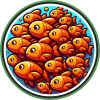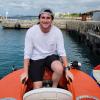Although they cover over 70% of our planet, only 0.6% of the world oceans are protected. It is estimated that we only know about 1 in 10 species in the ocean, which is unsurprising given that 90% of the ocean is more than half a mile deep and still remains largely unexplored. How might technology help us discover, understand and protect the vulnerable ecosystems below the waterline?
Marine Conservation is a fast-growing group in the WILDLABS community, capturing a wide variety of tech expertise within its member base, including those working with bioacoustic gear and hydrophones, AUVs and drones, sensors, machine learning, and more. By bringing together WILDLABS members from so many areas of conservation tech, the Marine Conservation group is the perfect place to collaborate on big, complex issues like marine biodiversity monitoring, coral reef health, plastic pollution, and sustainability.
The Marine Conservation group forum is also your place to chat about and solve the challenges unique to using conservation technology in marine environments. Whether you're struggling with deep-sea connectivity or salt water impacting gear longevity, or looking for remote solutions for long-term reef monitoring or biologging data collection, this group wants to help you explore the possibilities!
Check out some of the key marine conservation tech resources, conversations, and virtual events from across the WILDLABS platform:
Tutorials and Talks to Watch on Demand:
- Virtual Meetups: Developing cost-effective, open-source marine megafauna tracking, Jake Levenson
- Tech Tutors: How do I use open source remote sensing data to monitor fishing?, Max Schofield
- Virtual Meetups: eDNA for Aquatic Biodiversity, Alice Valentini
Case Studies, Tools, Research, and News:
- Southern Right Whales & Genome and Satellite Technology, Emma Carroll | eDNA & genomics, satellite data, biodiversity monitoring, climate change
- Building Experts Into AI, Whale Seeker | Machine learning, marine conservation, AI ethics
- Using AIS Data to Investigate the World’s Fishing Ports, Max Schofield | Remote sensing, data visualisation, fishing monitoring
- Small-scale fisheries and tech resources, Dan Steadman | Fishery monitoring, webinars, best practices
- Press Release: BAS Giant Iceberg Mission, British Antarctic Survey | Climate change, AUVs, remote sensing
- Case Study: Thermal imaging, drones, and loggerhead sea turtles, Megan Ossmann | FLIR, Duo Pro R camera, drones
- eDNA sampling to detect invasive snails in shipping ballast water, Gavin Shelton | Invasive species, eDNA, shipping
- Sustainable Fishing Challenges: Fish Catch Monitoring, Dan Steadman | Biologging, sensors, fishing monitoring
Conversations and Questions:
- Satellite tags for marine turtle recommendations | Alasdair Davies
- Calling all hydrophone users! | Team Open Acoustic Devices
- How difficult is it to build a buoy and constrain it in place? | Lindy Knowles
- Methods to detect Derelict Fishing Gear | Nandini Mehrotra
- Drone Mapping for Algal Blooms? | Harold Tay
- Minimising habitat impact of trawling gear | Dan Steadman
- Estimating carbon from 3d models of mangroves | Mark Brown
- Can we detect gillnets in turbid water? | Aurélie Shapiro
- New low cost DIY temperature loggers for reef monitoring | Harold Tay
- Machine learning to detect fish bomb blasts | Jamie Macaulay
Header Image: Emma Vogel
- @CarlosAbrahams
- | He/him
Baker Consultants
Director of Bioacoustics and Senior Lecturer



- 2 Resources
- 24 Discussions
- 4 Groups
WildTrack
Research, development and implementation of non-invasive montoring for endangered species



- 0 Resources
- 25 Discussions
- 12 Groups
- @GalZanir
- | he, him
Luc Hoffman Institute
Wildlife Entrepreneur | Innovation for Nature Conservation | Systems-thinking | Web3.0 | Artificial Intelligence | Agency for nature | DAOs | Rewilding & more
- 0 Resources
- 0 Discussions
- 8 Groups
- @diyaquanauts
- | he / him
Digital nomad, software developer, running mechatronic engineering firm in Seychelles to assist ocean conservation groups.
- 0 Resources
- 7 Discussions
- 9 Groups
- @Lucille
- | She/Her
University of Bristol, University of Auckland & La Trobe University
Marine bioacoustician and elasmobranch scientist
- 0 Resources
- 0 Discussions
- 5 Groups
- @laurenharrell
- | she/her/they/them
Data scientist/statistician working in bioacoustics and species distribution models, loves whales

- 0 Resources
- 0 Discussions
- 3 Groups
Cornell University


- 0 Resources
- 0 Discussions
- 6 Groups
- @Brickles
- | He/Him
- 0 Resources
- 0 Discussions
- 6 Groups
- @mariolambrette
- | he/him
Master's by Research student at the University of Exeter working on AI for underwater camera surveys
- 0 Resources
- 0 Discussions
- 4 Groups
- @Xavier_Mouy
- | he/him
I build software and hardware tools to help the analysis or the collection of passive acoustic data.
- 1 Resources
- 6 Discussions
- 6 Groups
- @nancyalice
- | she/her
Conservation Communicator | Technology for Wildlife Foundation (TfW)
- 0 Resources
- 0 Discussions
- 10 Groups

- 8 Resources
- 0 Discussions
- 4 Groups
ZSL is looking for an enthusiastic research scientist to join the multidisciplinary team and help deliver a project in Wales to better understand the ecology of tope sharks (Galeus galeus) in North Cardigan Bay and the...
9 April 2024
WWF is looking for consultant(s) with expertise in spatial data mapping and analysis.
19 March 2024
Hussey Labs seeks a senior post-doctoral researcher/senior research associate for movement ecology of Greenland halibut in the context of fisheries management across Baffin Bay-Davis Strait, Eastern Canadian Arctic.
13 March 2024
Whether you’re an aspiring or established entrepreneur, an early-stage startup, or a researcher, apply to the Project 71 – A Venture Competition for Ocean Regeneration. This competition is for you if you have a bold...
4 March 2024
Join the mission to help tackle IUU fishing with cutting-edge tech! The Allan Institute for AI is seeking a Senior Software Engineer to accelerate efforts to make sure those working to restore our ocean have the tools...
21 February 2024
SEE Shell is an innovative phone app that uses machine learning to identify products made from the shell of the critically endangered hawksbill sea turtle.
14 December 2023
Using baited remote underwater videos (BRUVs) to survey seagrass habitats along Kenya’s North Coast
30 November 2023
The Department of Applied Ocean Physics and Engineering (AOPE) at the Woods Hole Oceanographic Institution (WHOI) seek to hire 1-2 scientists at any of the Assistant/Associate/Senior Scientist levels to develop research...
27 November 2023
TagRanger® is a state-of-the-art wildlife finding, monitoring and tracking solution for research, conservation and environmental professionals. With superior configurability for logging data, reporting location and...
23 November 2023
Prospective PhD students with a background in acoustics and an interest in Arctic ecology are encouraged to email Michelle EH Fournet
16 November 2023
Engaging in seagrass conservation research along the Kenyan coast with dynamic approaches that integrate the skills I gained from the WiCT Training as part of my Master’s (by thesis) in Zoology program at Stellenbosch...
14 November 2023
We're delighted to announce that Connected Conservation Foundation and Airbus Foundation have today launched round 2 of the ‘Satellites for Biodiversity Award’.
2 October 2023
April 2024
May 2024
June 2024
October 2024
November 2023
event
| Description | Activity | Replies | Groups | Updated |
|---|---|---|---|---|
| Thanks, Wade! I think a number of these concerns are for pristine environments where cultural norms prohibit leaving anything on the land unnecessarily. It definitely touches on... |
|
Biologging, Marine Conservation | 3 days 16 hours ago | |
| Congrats @MattyD797 and team!!! We do a lot of work in the underwater bioacoustic realm and your tool certainly seems like it would be a great instrumental addition to the... |
|
Acoustics, Build Your Own Data Logger Community, Marine Conservation, Protected Area Management Tools, Sustainable Fishing Challenges | 1 week 1 day ago | |
| We could always use more contributors in open source projects. In most open source companies Red Hat, Anaconda, Red Hat and Mozilla, people often ended up getting hired largely... |
|
Acoustics, AI for Conservation, Conservation Tech Training and Education, Early Career, Marine Conservation | 3 weeks 1 day ago | |
| Hello everyone, I'm interested in gathering insights on how the behavior of different species impacts the development and efficacy of... |
|
Biologging, Acoustics, Camera Traps, eDNA & Genomics, Emerging Tech, Marine Conservation | 3 weeks 2 days ago | |
| Hi all, I am searching for marine species projects that monitor orientation/IMU and/or acceleration data... |
|
Biologging, Marine Conservation | 1 month ago | |
| Hi Scott, thanks so much for sharing your thoughts here! It would be great to learn more about this, would you be interested in finding a time to chat? Thanks! |
|
Marine Conservation, Sustainable Fishing Challenges, Wildlife Crime | 1 month 2 weeks ago | |
| Ah yes. I didn’t notice that. Indeed it’s “near infrared”, 850nm lighting. |
|
Camera Traps, Marine Conservation | 1 month 2 weeks ago | |
| Am working on similar AI challenge at the moment. Hoping to translate my workflow to wolves in future if needed. We all are little overstretched but it there is no pressing... |
|
Camera Traps, AI for Conservation, Build Your Own Data Logger Community, Data management and processing tools, Marine Conservation, Protected Area Management Tools, Remote Sensing & GIS | 2 months 2 weeks ago | |
| I dont have anything written up but I can tell what parts we used and how we tested.Its pretty straightforward, we used this M10 Enclosure Vent from Blue Robotics: Along with... |
|
Build Your Own Data Logger Community, Acoustics, Camera Traps, Climate Change, East Africa Community, Marine Conservation, Open Source Solutions, Protected Area Management Tools | 2 months 4 weeks ago | |
| Thanks Aude, very useful. Will reach out to them! |
|
Early Career, Acoustics, eDNA & Genomics, Marine Conservation, Protected Area Management Tools | 3 months 1 week ago | |
| Thank you for sharing! Super interesting, as we don't see many underwater stereo cameras! We also use Blue Robotics components in our projects and have found them reliable and... |
|
Sensors, Camera Traps, Marine Conservation | 3 months 2 weeks ago | |
| If you are considering an external microphone and a towed system, then you would also be in a position to consider a raspberry pi with an external microphone with sbts-aru.... |
|
Acoustics, AI for Conservation, Marine Conservation, Sustainable Fishing Challenges | 3 months 3 weeks ago |
A 3D printable, drone and ROV-mountable, water sampler
22 June 2016 4:28pm
The Coral Trait Database
5 May 2016 3:12pm
Blue Economy Challenge / Sustainable aquaculture for Indian Ocean developing countries
5 March 2016 2:14am
7 April 2016 2:35am
Jamieson, this is a great idea, and although my reply is rather delayed, it is not too late for me to update the message for Blue Economy Challenge applicants! I encourage applicants to the BEC to use this space to continue the conversation about technological innovations that will transform aquaculture.
2 May 2016 11:47am
Algae technology is central to innovation to conserve biodiversity against the threats of climate change. I am part of a global scientific group called Ocean Foresters. Our proposed Haven Atoll system aims to use algae to help save coral biodiversity and reduce ocean acidity. We are seeking partners for the Blue Economy Aquaculture Challenge.
In the northern section of Australia’s Great Barrier Reef, 95% of the coral is damaged or dead from excessive ocean heat. Coral bleaching is not limited to Australia, but is occurring in every ocean around the world. CO2 emissions are the cause of the crisis, but the real problem now is that emission reductions alone are just too slow to prevent catastrophic biodiversity loss. Immediate steps are needed to reduce the heat, acidity and nutrients that are killing our reefs. Algae is the key to save reefs by providing cooler and cleaner water in atolls. As Dr Tim Flannery argues in his 2015 book Atmosphere of Hope, the Ocean Foresters have presented compelling argument that large scale deployment of artificial forests of seaweeds, kelps and algae is the most promising response to fixing ocean health and removing CO2.
Ocean Foresters’ key proposal is called Haven Atolls, a system for protecting coral by growing large amounts of marine plants for fuel, food, fertilizer, fabric and fodder. Australia has the need, expertise, resources, locations and innovative culture to lead the world on Haven Atolls, targeted to the coral systems under most threat from global warming. Haven Atolls will produce fresh water, energy and algae products and protect local corals. Our key innovation is to bring cool nutrient-rich deep ocean water to the surface and feed it into coral atolls for sustainable aquaculture and to cool the coral during heat waves, protecting against global warming. The Haven Atoll will serve as a reservoir of biodiversity to seed reefs destroyed by bleaching. Haven Atolls will serve the global agendas of supporting food security and biodiversity, and will be critical to helping achieve negative carbon emissions, as identified by world governments in the Paris Climate Agreement as necessary to keep warming below two degrees.
Time is the enemy of coral. Our magnificent reefs are dying. Many have gone extinct or will soon. Algae systems can save the reefs while developing technology for sustainable energy and food supply and beginning to remove the dangerous extra carbon that fossil fuels have added to our air and sea. We urgently need partnerships for innovation, to implement rapid practical cost-effective methods to save our precious coral reefs from the looming extinction.
NOAA Webinar 14th April: Ocean Exploration and MPAs - Priorities, Technological Advances and Partnership
21 March 2016 2:28pm
How can technology help reduce manatee boat strikes?
9 February 2016 4:42pm
18 March 2016 5:23pm
Hi John,
Have you checked out Whale Alert? There may be some scope for applying/adapting the same technology for averting manatee strikes by applying it to the recreational boating sector.
Best regards,
Gavin

Beauty as a cheap monitoring tool for reefs?
26 November 2015 5:13pm














































18 March 2016 12:46am
I'll be entering the Blue Economy Challege. Would be really cool to start a conversation and collaboration between community members here and others who join the challenge. What if entrants to the BEC got a link to WildLabs and invited to join this conversation after they submitted their application?